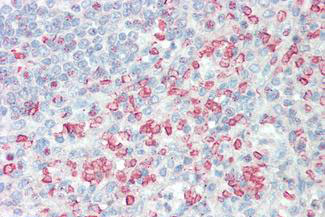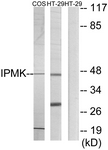IPMK Antibody (aa311-360)
Rabbit Polyclonal Antibody
- SPECIFICATION
- CITATIONS
- PROTOCOLS
- BACKGROUND

Application
| WB, IHC-P, E |
|---|---|
| Primary Accession | Q8NFU5 |
| Other Accession | 253430 |
| Reactivity | Human, Mouse, Rat |
| Host | Rabbit |
| Clonality | Polyclonal |
| Isotype | IgG |
| Calculated MW | 47222 Da |
| Dilution | ELISA (1:40000), IHC-P (10 µg/ml), WB (1:500 - 1:1000), |
| Gene ID | 253430 |
|---|---|
| Other Names | IPMK, IMPK |
| Target/Specificity | IPMK Antibody detects endogenous levels of total IPMK protein. |
| Reconstitution & Storage | PBS (without Mg2+, Ca2+), pH 7.4, 150 mM sodium chloride, 0.02% sodium azide, 50% glycerol. Store at -20°C for up to one year. |
| Precautions | IPMK Antibody (aa311-360) is for research use only and not for use in diagnostic or therapeutic procedures. |
| Name | IPMK |
|---|---|
| Synonyms | IMPK {ECO:0000303|PubMed:29883610} |
| Function | Inositol phosphate kinase with a broad substrate specificity (PubMed:12027805, PubMed:12223481, PubMed:28882892, PubMed:30420721, PubMed:30624931). Phosphorylates inositol 1,4,5-trisphosphate (Ins(1,4,5)P3) first to inositol 1,3,4,5-tetrakisphosphate and then to inositol 1,3,4,5,6-pentakisphosphate (Ins(1,3,4,5,6)P5) (PubMed:12027805, PubMed:12223481, PubMed:28882892, PubMed:30624931). Phosphorylates inositol 1,3,4,6-tetrakisphosphate (Ins(1,3,4,6)P4) (PubMed:12223481). Phosphorylates inositol 1,4,5,6-tetrakisphosphate (Ins(1,4,5,6)P4) (By similarity). Phosphorylates glycero-3-phospho-1D- myo-inositol 4,5-bisphosphate to glycero-3-phospho-1D-myo-inositol 3,4,5-trisphosphate (PubMed:28882892, PubMed:30420721). Plays an important role in MLKL-mediated necroptosis via its role in the biosynthesis of inositol pentakisphosphate (InsP5) and inositol hexakisphosphate (InsP6). Binding of these highly phosphorylated inositol phosphates to MLKL mediates the release of an N-terminal auto- inhibitory region, leading to activation of the kinase. Essential for activated phospho-MLKL to oligomerize and localize to the cell membrane during necroptosis (PubMed:29883610). Required for normal embryonic development, probably via its role in the biosynthesis of inositol 1,3,4,5,6-pentakisphosphate (Ins(1,3,4,5,6)P5) and inositol hexakisphosphate (InsP6) (By similarity). |
| Cellular Location | Nucleus. |
| Tissue Location | Ubiquitous, with the highest expression in skeletal muscle, liver, placenta, lung, peripheral blood leukocytes, kidney, spleen and colon. |
| Volume | 50 µl |

Thousands of laboratories across the world have published research that depended on the performance of antibodies from Abcepta to advance their research. Check out links to articles that cite our products in major peer-reviewed journals, organized by research category.
info@abcepta.com, and receive a free "I Love Antibodies" mug.
Provided below are standard protocols that you may find useful for product applications.
Background
Inositol phosphate kinase with a broad substrate specificity. Has a preference for inositol 1,4,5-trisphosphate (Ins(1,4,5)P3) and inositol 1,3,4,6-tetrakisphosphate (Ins(1,3,4,6)P4).
References
Nalaskowski M.M.,et al.Biochem. J. 366:549-556(2002).
Chang S.-C.,et al.J. Biol. Chem. 277:43836-43843(2002).
Daub H.,et al.Mol. Cell 31:438-448(2008).
Oppermann F.S.,et al.Mol. Cell. Proteomics 8:1751-1764(2009).
If you have used an Abcepta product and would like to share how it has performed, please click on the "Submit Review" button and provide the requested information. Our staff will examine and post your review and contact you if needed.
If you have any additional inquiries please email technical services at tech@abcepta.com.













 Foundational characteristics of cancer include proliferation, angiogenesis, migration, evasion of apoptosis, and cellular immortality. Find key markers for these cellular processes and antibodies to detect them.
Foundational characteristics of cancer include proliferation, angiogenesis, migration, evasion of apoptosis, and cellular immortality. Find key markers for these cellular processes and antibodies to detect them. The SUMOplot™ Analysis Program predicts and scores sumoylation sites in your protein. SUMOylation is a post-translational modification involved in various cellular processes, such as nuclear-cytosolic transport, transcriptional regulation, apoptosis, protein stability, response to stress, and progression through the cell cycle.
The SUMOplot™ Analysis Program predicts and scores sumoylation sites in your protein. SUMOylation is a post-translational modification involved in various cellular processes, such as nuclear-cytosolic transport, transcriptional regulation, apoptosis, protein stability, response to stress, and progression through the cell cycle. The Autophagy Receptor Motif Plotter predicts and scores autophagy receptor binding sites in your protein. Identifying proteins connected to this pathway is critical to understanding the role of autophagy in physiological as well as pathological processes such as development, differentiation, neurodegenerative diseases, stress, infection, and cancer.
The Autophagy Receptor Motif Plotter predicts and scores autophagy receptor binding sites in your protein. Identifying proteins connected to this pathway is critical to understanding the role of autophagy in physiological as well as pathological processes such as development, differentiation, neurodegenerative diseases, stress, infection, and cancer.



